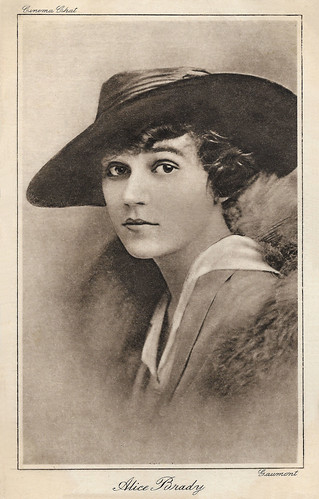
British postcard in the Cinema Chat series. Photo: Gaumont.

British postcard in the Film Weekly series. Photo: M.G.M. Alice Brady and Jay Eaton in Stage Mother (Charles Brabin, 1933).
World Film
Alice Brady was born Mary Rose Brady in 1892. She was the daughter of reputed theatrical producer William Brady. Her mother, French actress Rose Marie Rene, died in 1896. When Alice was a child her father married actress Grace George. Her half-brother was William A. Brady Jr, the son of her father and Grace George.
Mary Rose was interested at an early age in becoming an actress and she began her stage career when she was 14. She was educated in a convent school in Madison, New Jersey, and at the New England Conservatory of Music. She abandoned plans for an operatic career and, over her father’s objections, entered the theatre. The 18-year-old got her first job on Broadway in a minor role in 'The Mikado, a production with which her father was associated.
Billed as Mary Rose, Brady debuted on stage in 1911 in New Haven in the operetta 'The Balkan Princess'. Her first important success came on Broadway in 1912 when she created the role of Meg March in the original production of Marian de Forest's 'Little Women', a play adapted from the novel by Louisa May Alcott.
Brady's father moved into film production in 1913 with his new company World Film. Alice soon followed him, making her first silent feature appearance in As Ye Sow (Frank Hall Crane, 1914) with Douglas MacLean. Another twenty films at the World Film Corporation followed in which she played various roles - a Russian countess, an immigrant, and a dancer. She continued to perform on the New York stage, as World Film was situated nearby, in Fort Lee, New Jersey.
Now mostly forgotten, World Film was highly active during the 1910s as a production and distribution company, which even had a separate, all-French section with French emigre directors such as Léonce Perret, Emile Chautard, Maurice Tourneur, and Albert Capellani. In 1918 Alice returned to Broadway in the hit 'Forever After'.

American postcard by K. Co. Inc., New York, no. 149. Photo: Realart Pictures.

French postcard by Editions Filma in the Les Vedettes de l'Écran series, no. 95. Photo: Realart Pictures, c. 1921.
Select Films, Realart Pictures and Paramount
In 1918 Alice Brady moved to Select Pictures of former World Film manager Lewis Selznick, the father of David O. Selznick. In 1918-1919, she appeared in a dozen films, such as Woman and Wife (Edward José, 1918) and At the Mercy of Men (Charles Miller, 1918), and worked with American and French émigré directors such as Alan Crosland and Emile Chautard.
In 1921 Brady acted at Realart Pictures and in 1921-1923 at Paramount. In 1923, Brady stopped appearing in films to concentrate on stage acting. She enjoyed great successes in 'Zander the Great' (1923), 'Old Mama' (1925), and 'The Bride of the Lamb' (1926). In 1931 she appeared in the premiere of Eugene O'Neill's famous play 'Mourning Becomes Electra' with Alla Nazimova. A year later, she acted in 'Mademoiselle' (1932). She did not appear on the screen until 1933.
In 1933, she made the move to Hollywood and M-G-M's When Ladies Meet became her first talking picture. Her talents on the stage aided her successful transition from silent movies to talkies. Alice Brady acted in another 25 sound films, including the musical The Gay Divorcee (Mark Sandrich, 1934) starring Fred Astaire and Ginger Rogers, Three Smart Girls (Henry Koster, 1936) and One Hundred Men and a Girl (Henry Koster, 1937) with Deanna Durbin. In the comedy My Man Godfrey (Gregory La Cava, 1936), she played the flighty and socially ambitious mother of Carole Lombard's character. Brady was nominated for an Oscar for her role but lost.
In 1938, she won the Academy Award for Best Supporting Actress as Mrs. Molly O'Leary, the mother of Tyrone Power in In Old Chicago (Henry King, 1937). A long-enduring myth retold on Dutch Wikipedia, states that at the Academy Awards presentation dinner, Brady's Oscar was stolen by a man who came onstage to accept the award on the actress's behalf. She was absent due to a broken ankle According to the myth, the statuet was never recovered, and the impostor was never tracked down. However, according to the press at the time the film's director, Henry King, accepted on her behalf at the ceremony and friends of Ms. Brady delivered it to her home later that night. Winners were given blank awards at the ceremony and returned them to the Academy to have them engraved afterwards. In 2016, the Oscar historian Olivia Rutigliano noted that Brady also followed this practice, which may have led to the story that the Academy was presenting her with a replacement trophy that never reached her because of her early death.
Alice Brady worked until six months before her death from cancer in 1939. Her final film was Young Mr. Lincoln (John Ford, 1939) starring Henry Fonda. She was only 46 years old when she died in New York. All in all, she acted in some 80 films. Between 1919 and 1922 Alice Brady was married to actor James Crane, with whom she acted in three films and had one son, Donald William Crane who died in 1942. She was interred at Sleepy Hollow Cemetery in New York. In 1960, Brady received posthumously a Motion Pictures Star on the Hollywood Walk of Fame for her contributions to the film industry. Her star is located at 6201 Hollywood Boulevard.

Swedish postcard by Förlag Nordisk Konst, Stockholm, no. 907.

British postcard. Photo: Gaumont / Select Pictures. Select Pictures refers to the American production company Select Pictures (1917-1923) by Lewis Selznick, which he had founded in 1916 as Selznick Pictures, after losing control of the company World Film.

American postcard.
Source: Denny Jackson (IMDb), Wikipedia (Dutch, French and English), and IMDb.
No comments:
Post a Comment